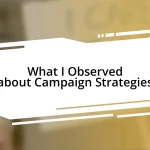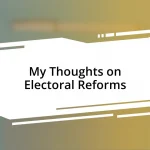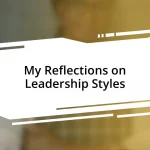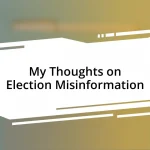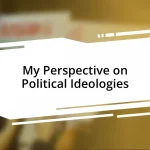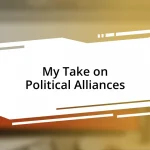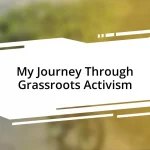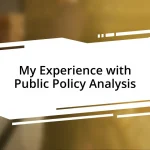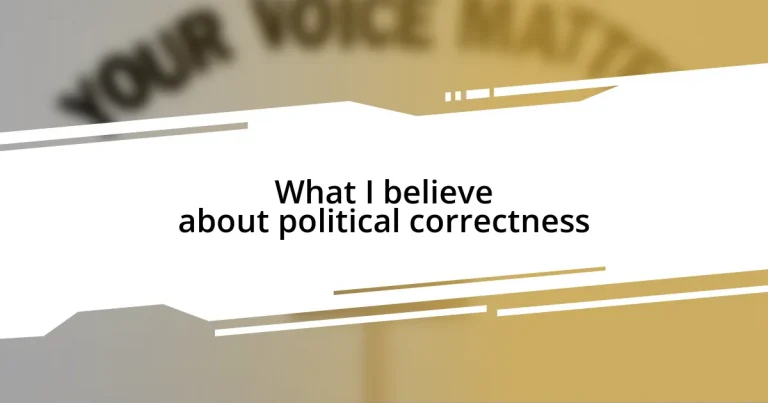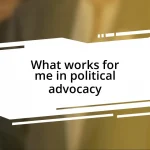Key takeaways:
- Political correctness aims to promote inclusive language and behavior, fostering respect for individual identities and experiences.
- Its origins trace back to leftist movements in the 1960s-70s, later evolving into mainstream discussions around language and respect in the 1980s-90s.
- Respectful language helps build trust, encourages dialogue, and nurtures community, while also navigating the complexities of free speech and genuine expression.
- Finding a balance between sensitivity and honesty in conversations is essential, as uncomfortable discussions can lead to meaningful insights and understanding.
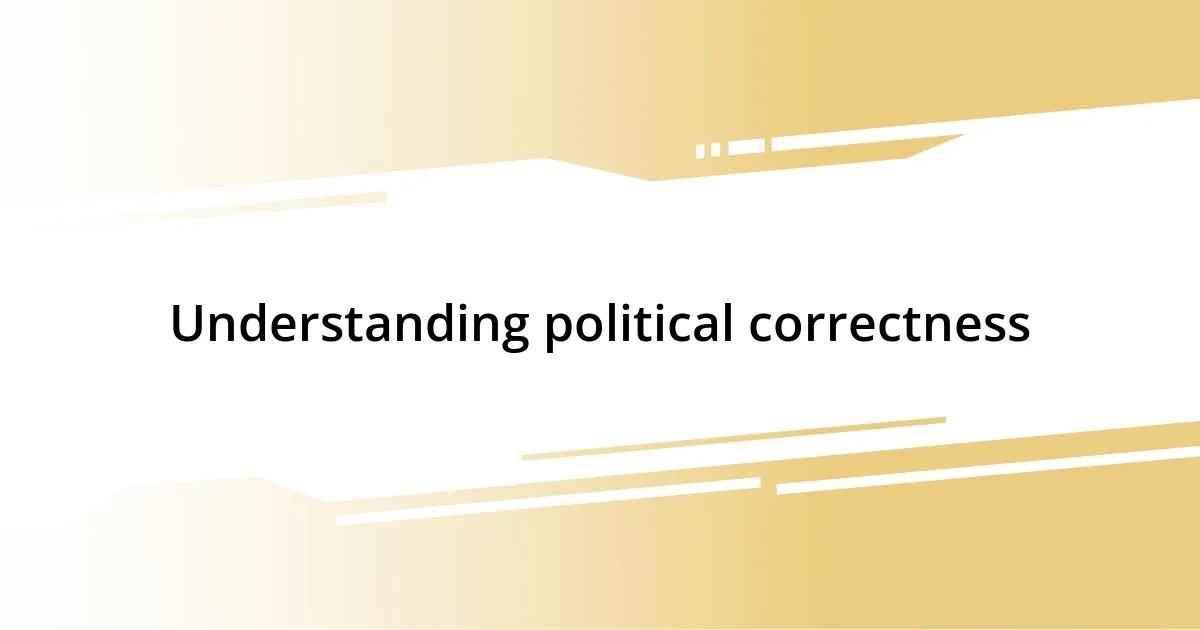
Understanding political correctness
Political correctness, at its core, aims to promote inclusive language and behavior that respects individuals’ identities and experiences. I remember a time in college when a classmate shared a story about how certain terms made them feel marginalized. It struck me how powerful language can be and how small changes in our word choices can greatly impact someone’s sense of belonging.
There are often discussions around whether political correctness limits free speech or fosters a more respectful society. I’ve found myself in heated debates about this, questioning if it’s possible to express opinions freely while being sensitive to others’ feelings. Isn’t there a way to strike a balance between truth and kindness, without censorship?
Furthermore, it’s essential to understand that political correctness isn’t about policing every word we say. Rather, it’s about becoming more aware of how our words affect others. I recall an instance when I unintentionally offended someone by using an outdated term; it was a wake-up call for me to realize that my language could unintentionally hurt others. Isn’t it worth the effort to create a more respectful dialogue?
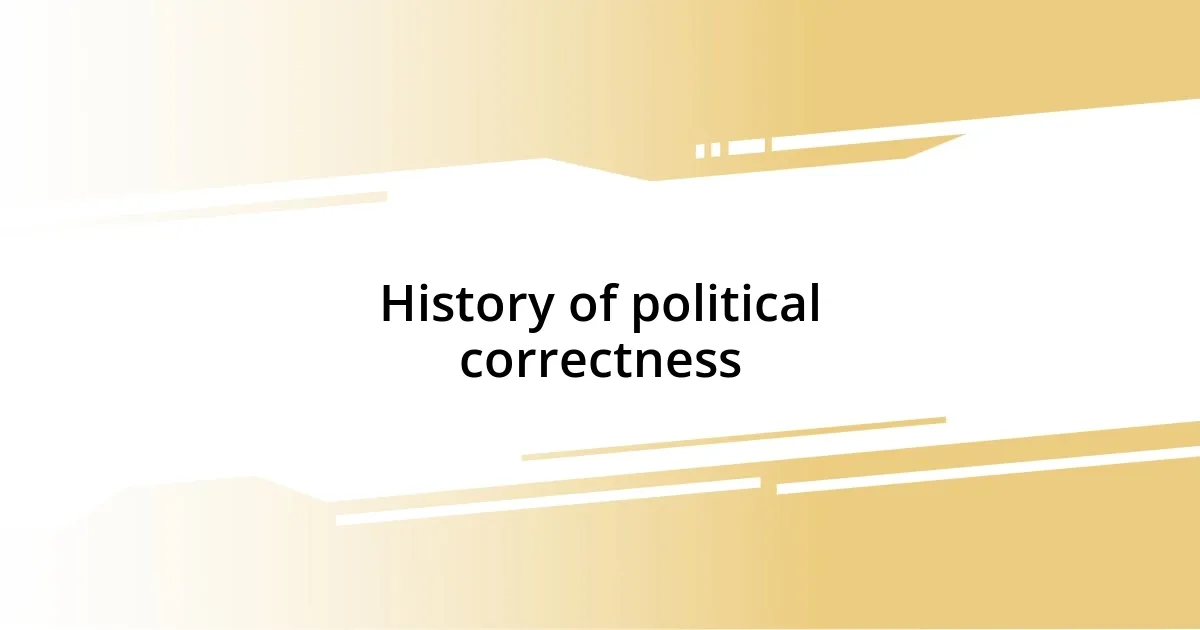
History of political correctness
Political correctness has intriguing roots that trace back to the 20th century. Originally, it emerged within leftist political movements, particularly in the 1960s and 1970s, advocating for social justice and equality. I recall a documentary I watched that highlighted how activists fought for the right to be referred to in ways that validated their identities—an empowering shift towards recognizing marginalized voices.
As the years progressed, this concept began to morph into broader societal practices. In the 1980s and 1990s, political correctness moved into mainstream culture, influenced by academia and media. I distinctly remember listening to a radio talk show where the host debated the pros and cons of using gender-neutral language. It was fascinating to hear people passionately express how something as simple as pronouns could signify respect and acknowledgment of one’s identity.
In more recent times, the discussion around political correctness has grown louder, often associated with debates on freedom of speech. It can feel overwhelming, especially when observing how some people resist these shifts as overly cautious or restrictive. From my perspective, this discomfort often stems from a fear of change; I’ve seen how difficult it can be to adapt our language, but I find it rewarding when those efforts foster deeper understanding among diverse groups.
| Time Period | Key Events/Developments |
|---|---|
| 1960s-1970s | Emergence in leftist movements advocating for respect and social justice. |
| 1980s-1990s | Shift to mainstream culture influenced by academia and media discussions. |
| 2000s-Present | Increasing debates on the balance between political correctness and free speech. |
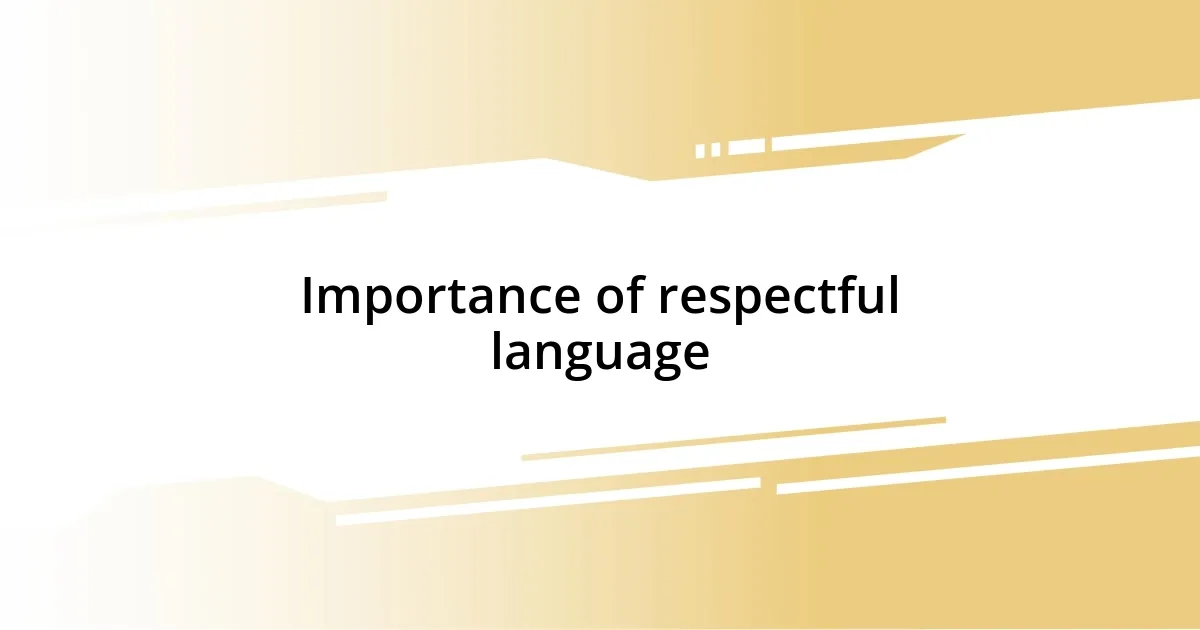
Importance of respectful language
Respectful language plays a fundamental role in nurturing a society where everyone feels valued. I often find myself reflecting on conversations that stand out because of the positive tone they set. For instance, when someone uses inclusive language, it creates an atmosphere where people are more willing to share their perspectives. It’s as if words can act like a bridge, enabling us to connect with each other on a deeper level.
- Builds trust and rapport
- Encourages open dialogue
- Validates individual experiences
- Reduces misunderstandings
- Fosters community and inclusion
When I think about times I’ve witnessed the power of respectful language, I remember a community event I attended where different cultures were celebrated. The organizers made a conscious effort to use language that embraced everyone’s identities, and it was palpable how this choice fostered a sense of belonging. People exchanged stories freely and laughed together, showcasing the magic that can happen when language uplifts rather than divides. Respectful language isn’t just about avoiding offense; it’s about creating an environment where connection can thrive.

Political correctness in today’s society
In today’s society, political correctness is a double-edged sword. While I often appreciate how it encourages more considerate communication, I’ve also noticed that it sometimes leads to an atmosphere of caution that stifles genuine expression. I remember a time at a workplace gathering when a colleague hesitated to share their opinion on a hot topic because they feared backlash for not conforming to politically correct norms. It made me wonder: Is our drive for sensitivity overshadowing the importance of honest dialogue?
The rise of social media amplifies this tension, as the thin line between accountability and censorship becomes blurred. Just last week, I stumbled upon a trending tweet that sparked heated debates about a seemingly innocuous comment. Some applauded the user for calling out a microaggression, while others accused them of being overly sensitive. How do we find common ground when perspectives clash so sharply? I believe it’s essential to foster conversations that allow for both respect and the freedom to speak one’s mind.
Personal experiences shape our views on political correctness, and I often find myself navigating its complexities. I recall a community meeting where language played a pivotal role; a speaker used inclusive phrasing that resonated with many, yet I sensed discomfort from a few attendees who felt things were getting too politically correct. This scenario highlights an important question: Can we challenge ourselves to redefine what it means to be politically correct in a way that embraces both understanding and authentic expression? The journey might be rocky, but I argue it’s worth exploring together.
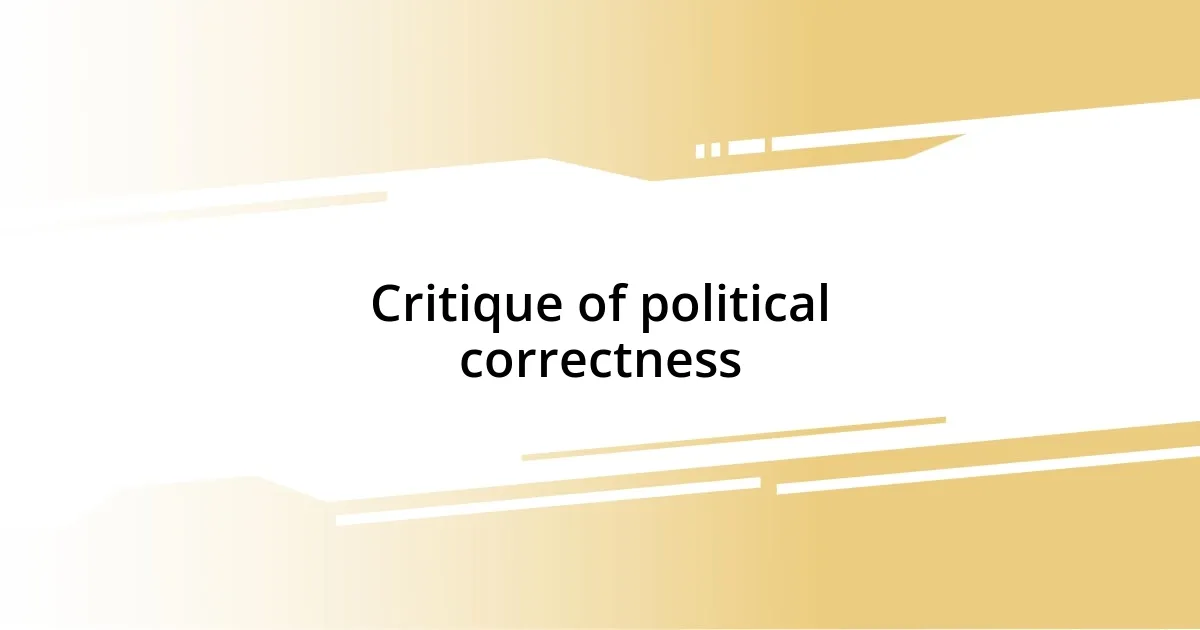
Critique of political correctness
In critiquing political correctness, I’ve often encountered a sense of unease when conversations shrink under the weight of overly cautious language. I recall a friend who shared a story that should have sparked laughter, but the room felt heavy with unspoken fears of offending someone. This made me wonder—are we sacrificing humor and warmth for the sake of not stepping on toes?
There are moments when political correctness seems to stifle rather than stimulate discussion. At a recent book club, I noticed how a member’s insightful critique was met with a chorus of “that’s not PC.” It struck me that our intention to be thoughtful can sometimes morph into a shield that protects fragility but erects walls between us. Shouldn’t we embrace discomfort as part of growth?
I also feel a tension between respecting individual identities and the fear of walking on eggshells. I remember a debate among friends about a topical issue where a simple question about the meaning behind someone’s preferred term turned into an awkward silence. That exchange lingered with me—why is it so difficult to ask questions when curiosity stems from a place of respect? Isn’t it important to create a space where we can learn and evolve without fear of judgment?
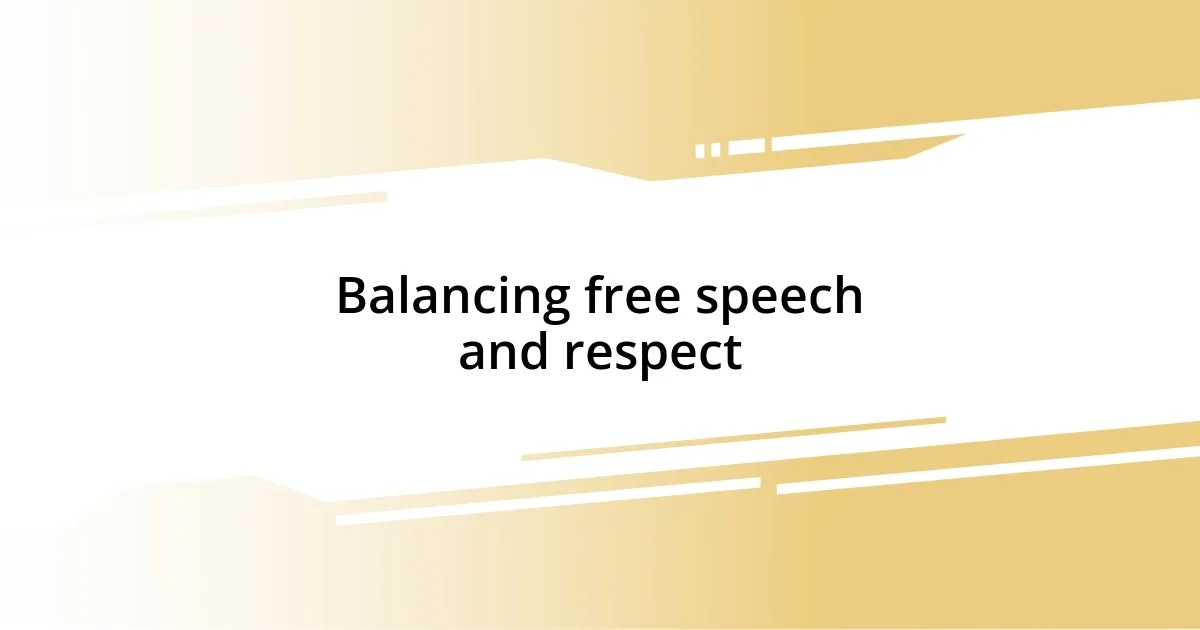
Balancing free speech and respect
Balancing free speech and respect feels like walking a tightrope. I once attended a panel discussion about freedom of expression, and while the facilitator encouraged open dialogue, I noticed certain comments made others visibly uncomfortable. It left me thinking—how do we navigate the fine line between promoting honesty and honoring differing perspectives? Acknowledging that everyone has unique experiences is vital, but does that mean we must censor ourselves?
In another instance, I was part of a community forum where a newcomer bravely shared their opinion on a controversial topic. The room fell silent, and despite the initial tension, the conversation that followed was enlightening. I realized then that while some individuals may instantly feel offended, discomfort can lead to meaningful discussions. Isn’t it intriguing how the most valuable exchanges often arise from difficult conversations?
Additionally, I’ve frequently observed how the intent behind words can change their reception. During a dinner gathering, a friend attempted to clarify a point, but their choice of words inadvertently triggered someone else’s sensitivities. It made me reflect—shouldn’t we aim for understanding rather than perfection in our speech? As we strive to foster a culture of respect, it’s crucial to remember that genuine progress often requires navigating uncomfortable truths with empathy and compassion.
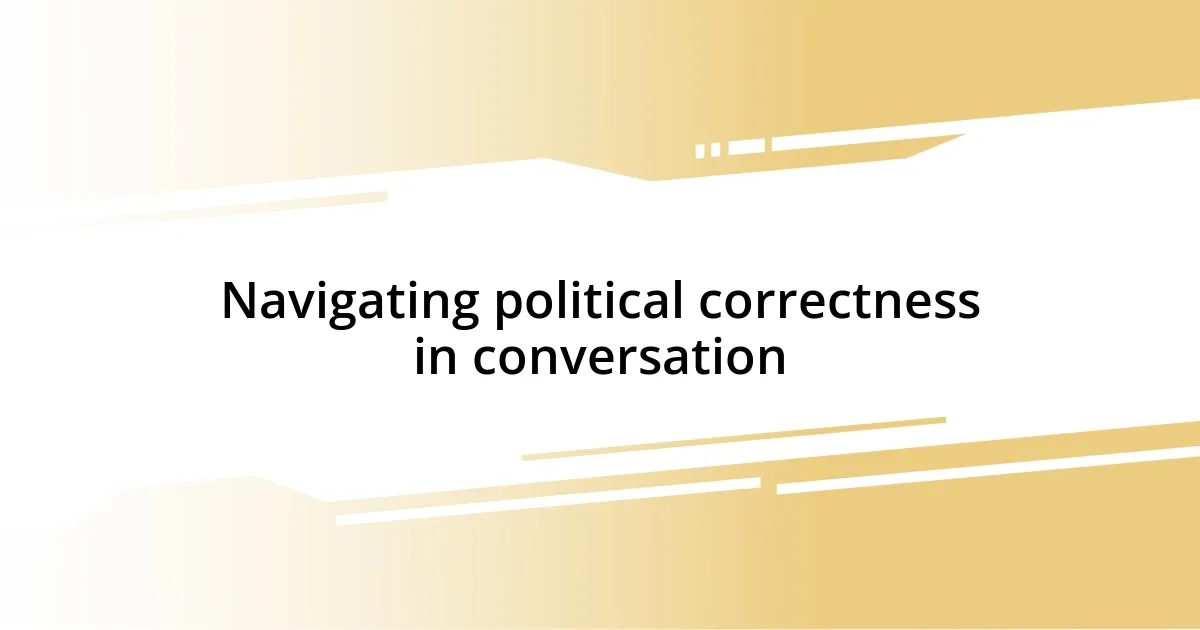
Navigating political correctness in conversation
Navigating political correctness in conversation can sometimes feel like sailing through murky waters. I recall a casual dinner where a friend shared a story about their childhood. The laughter quickly turned to a hush when someone suggested the term used might be offensive today. It made me wonder, how do we balance being mindful with the spontaneity of authentic conversation?
In a recent workshop on effective communication, I found myself in a fascinating discussion about using inclusive language. As we practiced rephrasing our thoughts, I felt the creative energy in the room shift. I realized we weren’t just replacing words; we were re-examining the very foundations of how we connect. Isn’t it empowering to know that the language we choose can either open doors or close them?
I also experienced a moment during a family gathering that really hit home. We were discussing social issues when an uncle shared a viewpoint that some considered outdated. Instead of immediately challenging him, I opted for a questioning approach. By asking him to elaborate on his perspective, the dialogue shifted from confrontation to understanding. This encounter taught me that navigating these conversations requires patience and curiosity. How often do we let fear of backlash drown out the opportunity for enlightenment?


